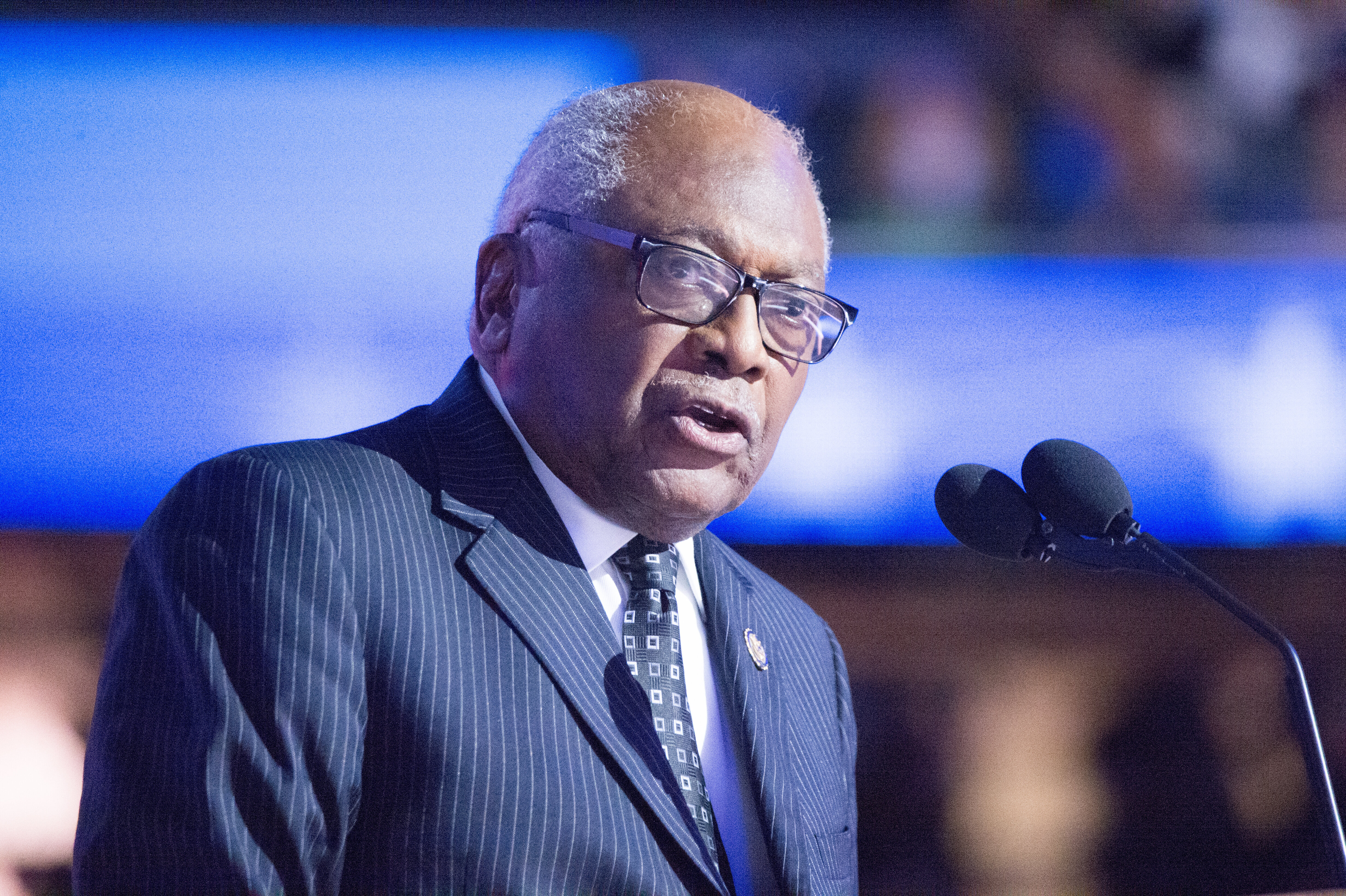
South Carolina Rep. James Clyburn, one of the most influential Democrats in the country, on Thursday praised Federal Trade Commission Chair Lina Khan’s work, endorsing her continued tenure as the United States’ top antitrust regulator.
Clyburn spoke to HuffPost in a joint interview with Khan to tout the FTC’s $48 million settlement this week with Invitation Homes, a corporate landlord that the FTC accused of bilking renters for millions of dollars in junk fees, and hiding those fees through false advertising. During the COVID-19 pandemic, Clyburn had investigated allegedly illegal evictions conducted by Invitation Homes in his capacity as chair of the House Select Subcommittee on the Coronavirus Crisis. Invitation Homes is also a major landlord in Clyburn’s home state.
Asked about the Democratic megadonors from the business world who have been pushing Vice President Kamala Harris to drop Khan if Harris wins the 2024 White House race, Clyburn described the public pressure as “foolishness.”
“Should be fired for what? For doing your job? I think she’s doing a good job. I think this is an indication of doing that job,” he said, referring to the Invitation Homes settlement. “I suspect that people who represent Invitation Homes may want her to be replaced by somebody who would not do their jobs.”
Clyburn compared criticism of Khan to the opposition his daughter Mignon Clyburn faced while she served as a member of the Federal Communications Commission.
“People who come into these administrations, they come with not just competence but compassion,” he said. “And I think that the [FTC chair] has shown competence and compassion. And those people who are lacking in compassion, they’re never going to come around to your way of thinking.”
Clyburn has not shared his support for Khan directly with Harris, he said.
“I’m concentrating now on getting the vice president elected president, and I will talk about the implementation of an administration after that,” he said. “But I certainly have no reason not to be in support of the chairlady for this position.”
Clyburn’s endorsement is a critical vote of confidence for Khan, whose aggressive approach to enforcement marks a break with more accommodating predecessors. Khan’s work, which includes an ambitious attempt to ban noncompete agreements across the country, has won praise from antitrust advocates in both major political parties, including a small but influential faction of populist conservatives known as “Khanservatives.”
It has also earned her the ire of major investors and corporate executives, who argue her opposition to mergers has chilled innovation.
Some of these corporate titans see in Harris an opportunity to break with the economic populism of President Joe Biden’s administration. Reid Hoffman, the LinkedIn co-founder and venture capitalist who has donated $7 million to electing Harris, engaged in a public campaign for Harris to drop Khan over the summer.
What’s more, the prominent role of Tony West, Harris’ brother-in-law and the chief legal officer for Uber, in Harris’ campaign has raised concerns among progressives about the direction of her regulatory policies. Harris has been subtly pitching herself to the business world as more open than Biden to its concerns; West’s relationships with business leaders and donors have been a part of that strategy.
“I think she's doing a good job. I think this is an indication of doing that job.”
- Rep. James Clyburn (D-S.C.)
The support of Clyburn, the personification of the moderate Democratic establishment, is a major coup for Khan, however. The former House majority whip famously played a pivotal role in helping Biden lock up the Democratic presidential nomination in 2020, and had the president’s ear once in office.
Although Khan does not comment on the politics surrounding her post, she has seized opportunities to promote her work in the press, which suggests she understands a thing or two about how power operates in Washington. CBS News’ prestigious weekly news magazine show, “60 Minutes,” profiled her on Sunday with a focus on her work to combat the kind of corporate malfeasance that both Khan and Harris hold responsible for driving inflation.
The crackdown on Invitation Homes’ practices is another chance for Khan to highlight her work on behalf of consumers. The FTC’s investigation of the country’s largest landlord of single-family homes found that the company advertised rentals that failed to inform potential customers of mandatory junk fees that could total $1,700 yearly, neglected to invest in promised upkeep of the properties, used arbitrary practices to withhold renters’ security deposits after move-out, and violated the Centers for Disease Control and Prevention’s eviction moratorium during the COVID-19 pandemic.
Invitation Homes engaged in these practices to pad profits for investors, according to the FTC, which cited a 2019 email from one key executive describing a mandatory fee as a way to “juice this hog.”
“These types of practices were not just some type of honest mistake. They were actually part of Invitation Homes’ strategy for how to, in its words, ‘juice the hog,’” Khan said Thursday.
“These are just really atrocious practices, including what we found with unfair eviction proceedings that the company was initiating,” she added. “Really we’re so grateful for the congressman’s [Clyburn’s] leadership on this issue.”
The $48 million settlement money that Invitation Homes agreed to pay out is intended to provide refunds to consumers negatively affected by the landlord’s practices.

The company has also agreed that it will no longer conceal rental fees, withhold security deposit money for minor damage typically considered part of normal wear and tear, use security deposit money to fix damage present when a renter moved in, or seek to evict renters who have already moved out of their homes. When conducting an eviction, the company must also inform renters about assistance they can receive from federal, state, and local governments.
Corporate ownership of rental properties, particularly single-family homes, was relatively rare until the 2008 financial crisis when home price crashes and a wave of foreclosures created the opportunity for businesses like Invitation Homes to gain a foothold in the market — often with the backing of private equity companies like Blackstone, which owned Invitation Homes before selling its stake in 2019. These corporate landlords are more likely to jack up rents and evict renters than smaller, mom-and-pop landlords.
In July, the White House called on Congress to pass legislation requiring corporate landlords to cap rent increases on existing properties at 5% a year if those landlords want access to select federal tax breaks. Harris’ campaign website says she would “sign legislation to outlaw new forms of price fixing by corporate landlords,” though it’s unclear if that includes a bill of the kind outlined by the White House.
Clyburn said he supports the White House’s proposal, but that he has not yet spoken to Harris about it. He applauded Harris’ plan to build 3 million new housing units.
“I’m hopeful that the ‘affordable’ tag will be placed on that as well,” he said. “And of course, I’ve always been a big advocate of using the tax code to incentivize that kind of activity for rental homes.”
Without commenting on the White House’s specific proposal, Khan indicated she would welcome additional regulations.
“Any time Congress wants to give enforcers additional tools so that Americans are further protected, I see that as a good thing, and we’re always happy to give technical assistance on legislation,” she said.
Disclaimer: The copyright of this article belongs to the original author. Reposting this article is solely for the purpose of information dissemination and does not constitute any investment advice. If there is any infringement, please contact us immediately. We will make corrections or deletions as necessary. Thank you.
